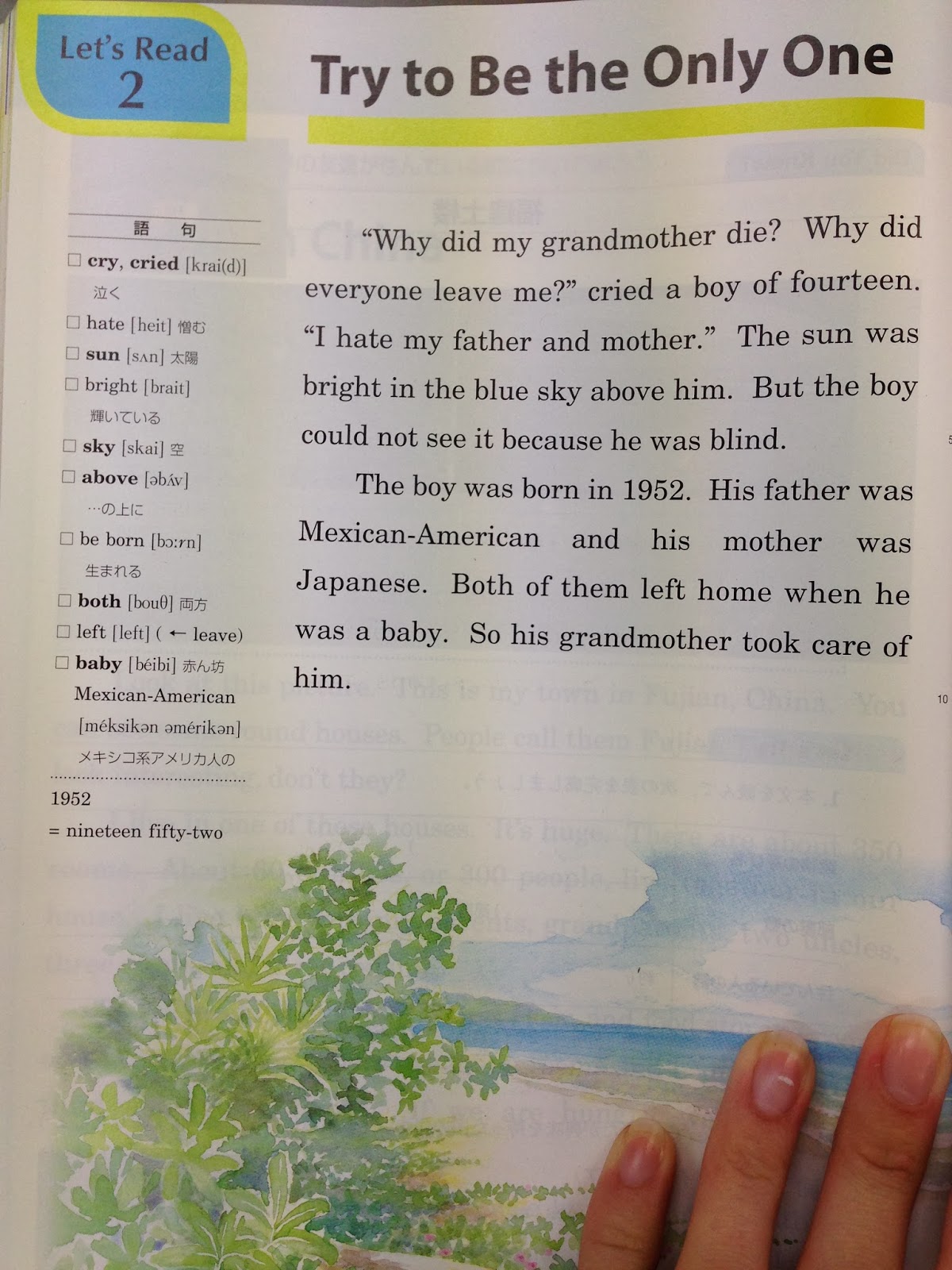Try to Be the Only One is a story in the textbook for my 8th grade students. I find it interesting that a story of this nature is a part of the curriculum. Japanese culture is very much about separating what is Japanese and what is not. Yet this story is in a Japanese school district's textbook!
While this story does not specifically name Christianity as the faith adopted by the main character, it is easily recognized as such. That is, it is recognizable to me, a western-minded Christian. I imagine that to the average Japanese student, it wouldn't be recognized as anything but a story. It is my hope is that this is a sign of the Lord's work in Japan; that this is His way of reaching to the youth of Japan.
Numerous Japanese encounters and conversations about Christian faith have clearly drawn the line which declares, "you are an American. Americans are religious, thus you are Christian. I am Japanese, therefore I am not." To be Japanese is to be "born Shinto, and die Buddhist" is what I've heard. To accept Christianity is to stand out from the rest, deny your ancesters' beliefs, and live apart from what is the Japanese way.
With some guidance from our church leaders, I tested the waters to see what I could get myself into. I mentioned to one of the English teachers teaching this lesson that the story is about Christianity. After he agreed with me that it is, I also pointed out that Christianity is not a part of Japanese culture, but a part of my culture. Intrigued, he nodded in agreement. (Going in for the punch), I asked if it would be alright if I shared my own story that somewhat mirrored that of the character in the text book and explain how Christian faith helps believers through difficult times. I also added that I would like to show my favorite hymn being sung in Japanese. (drum roll) He said that he would like that and asked me to prepare to share this with the students next week, after they have read and learned about the textbook's story.
I am preparing a short presentation that very briefly tells the students of my dad's death and the chaos emotions of it all. I am attempting to explain how my faith has helped me and continues to help me every day. It is very challenging for me to do. I have never tried to explain my faith to anyone who knows absolutely zip about Christianity. Some of these kids may have never heard the term "Christian." How many people do you know have never heard the word "Christian"? If you're living in the United States of America, I don't think that is many.
I also didn't realize how "churchy" my language was until I sat down and started drafting this presentation. There are so many things we say that people who have no idea what our faith is about wouldn't understand.
Finally, I'm challenged to talk about my faith as my faith and not come off as persuasive or forward. (When, obviously, my hope is that this will spark some curiosity in a few of the 200 students that will be listening to my story.)
With the grace of God and the help of my husband and our Japanese church leaders here in Mito, I'll have this ready by next week for the 8th grade students of Gochu. If it goes well, they may let me give the same presentation for the 8th grade class of next year.
Please be praying for the 200 students that will hear this lesson next week and the two teachers that are allowing me to do this.

"It Is Well" (my favorite hymn) in Japanese, skip to 1:55 to bypass the introduction.
For those of you wondering, I personally will skip the introduction during class. Our ministers wife made a wonderful point saying that this kind of peace is difficult for most Christians to understand, much less someone who has never heard of Christianity before. And that after experiencing great loss, it usually isn't comforting (and actually quite insensitive) to hear people say, "REJOICE"!
I agreed with her 100%. After my father died, people told my mother "oh you're young. You'll remarry." Yes, it was true, my mother did remarry. And this comment was made with the most loving intention. But how disrespectful of the marriage and years spent between my mother and father. And how insensitive to not allow a widow to be in her mourning.
Therefore, the approach I am taking is from a personal stance and explaining "it is well with my soul", rather than encouraging that it should be "well with [your] soul."
And finally, here is Aragaki Tsutomu, the character from the story, singing Amazing Grace.



No comments:
Post a Comment